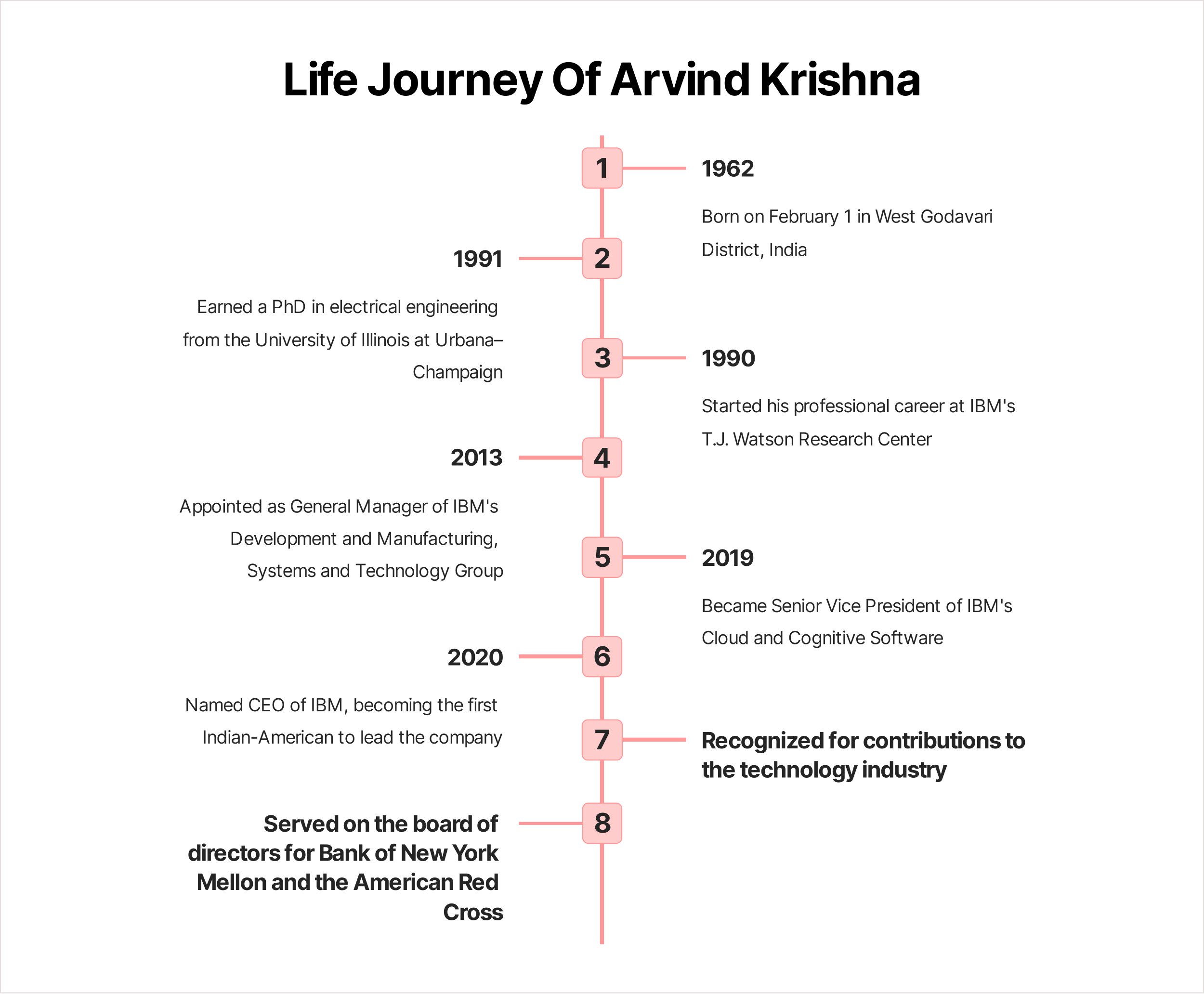Arvind Krishna
Arvind Krishna leads an elite group of Indian-origin executives at the helm of global tech giants. The 61-year old CEO from West Godavari, Andhra Pradesh took charge of IBM in April 2020 after spending over three decades with the company. His story reflects technical brilliance, strategic vision and continuous growth.
Arvind Krishna’s education became the foundation of his future success. He earned his Bachelor of Technology in electrical engineering from the Indian Institute of Technology Kanpur in 1985. His academic journey continued at the University of Illinois Urbana-Champaign, where he completed his Doctor of Philosophy in electrical engineering in 1991. This strong academic background gave him the technical expertise that shaped his career at IBM.
CEO’s | Actors | Politicians | Sports Stars
IBM has seen revolutionary changes under Arvind Krishna’s leadership. He showed exceptional strategic insight as the key architect behind IBM’s largest acquisition – the $34 billion Red Hat deal. This bold decision has brought impressive results with IBM’s software segment growing 10% in revenue, thanks largely to the Red Hat subsidiary. His focus on artificial intelligence has helped IBM’s generative AI business reach nearly $2 billion each quarter.
IBM CEO Arvind Krishna stands among other distinguished Indian-origin executives like Satya Nadella of Microsoft and Sundar Pichai of Alphabet who lead major global technology companies. His intellectual impact goes beyond business leadership – he has co-authored 15 patents and published in over 40 technical journals. Since becoming Chairman in January 2021, IBM’s stock prices have risen 12% under his leadership, which highlights his impact as a transformative business leader.

Early Life and Education
Family background and upbringing
A Military Heritage: Arvind Krishna was born on February 1, 1962, in the West Godavari District of Andhra Pradesh, India. He grew up in a Telugu-speaking family that valued discipline and service. His father, Major General Vinod Krishna, was an Indian Army officer who taught young Arvind the importance of discipline and dedication. His mother, Aarathi Krishna, helped Army widows and showed him the value of compassion and social responsibility. These early influences helped shape Arvind Krishna into a leader who would later head one of the world’s largest technology companies.
Cultural Foundations: His life in a military family gave Arvind a unique perspective. He learned traditional Indian values while adapting to new environments because of his father’s different postings. This background made him adaptable and resilient – qualities that became valuable throughout his career. While not much is known about his childhood interests, his later educational choices show he had an early interest in technology and engineering.
Schooling in India
Early Education: Arvind Krishna started his formal education at Stanes Anglo Indian Higher Secondary School in Coonoor, Tamil Nadu. The school was known for its strict academic standards. He then went to St. Joseph’s Academy in Dehradun, where he continued to develop his academic skills.
Academic Foundations: His time at schools in Tamil Nadu and Dehradun gave him a rich learning experience. These respected institutions helped develop his critical thinking and academic excellence. The structured environment and competitive atmosphere prepared him for the challenging technical education ahead.
IIT Kanpur and academic excellence
Engineering Beginnings: In 1980, Arvind Krishna joined one of India’s top technical schools – the Indian Institute of Technology, Kanpur (IIT Kanpur). He studied Electrical Engineering from 1980 to 1984 and showed exceptional technical understanding. IIT Kanpur gave him a strong foundation in engineering principles and problem-solving methods.
Technical Foundation: His time at IIT Kanpur helped him gain deep knowledge of electrical engineering that became useful in his future research and leadership roles. He earned his Bachelor of Technology degree in 1985. Though details about his academic performance aren’t public, getting into and graduating from this competitive institution speaks volumes about his abilities.
PhD journey at University of Illinois
American Education: After his undergraduate degree, Arvind Krishna decided to pursue higher education in the United States. He chose the University of Illinois at Urbana-Champaign. He completed his Master of Science (MS) in Electrical and Computer Engineering in 1987, building on what he learned at IIT Kanpur.
Doctoral Research: He stayed at the University of Illinois to pursue his doctoral degree. His hard work paid off in 1991 when he earned his Ph.D. in Electrical and Computer Engineering[81]. This academic experience gave him advanced technical knowledge and research skills that became valuable during his career at IBM. His doctoral education also helped him understand innovative technology and research methods that shaped his vision as a business leader.
Academic Recognition: Both IIT Kanpur and the University of Illinois at Urbana-Champaign have recognized Krishna’s achievements with distinguished alumni awards. These honors show how his education laid the groundwork for his remarkable career.
Time Line

Joining IBM and Climbing the Ranks
Starting at IBM Research Center
Research Beginnings: Arvind Krishna started his career at IBM in 1990 at the Thomas J. Watson Research Center. This marked the start of his remarkable 30-year career with the technology giant. He dedicated his first 18 years exclusively to Watson Research. During this time, he built his technical expertise and laid the groundwork for his future leadership roles. His long stint in research helped him develop specialized knowledge in emerging technologies that would later shape IBM’s direction.
Technical Foundations: Krishna’s early years at IBM Research focused on groundbreaking work that influenced many of IBM’s key technological initiatives. His research spanned several critical areas and established him as an expert in advanced computing technologies. The years he spent in IBM’s research division gave him a detailed understanding of the company’s technical capabilities and growth potential. This knowledge became crucial as he moved into leadership positions.
Innovations in cloud and AI
Technological Visionary: After his research years, Krishna became a key driver of state-of-the-art developments across several advanced domains at IBM. He led breakthroughs in artificial intelligence, quantum computing, blockchain technology, and cloud platform services. WIRED magazine recognized his technical brilliance in 2016 and named him “one of 25 geniuses who are creating the future of business” for his pioneering work in blockchain technology. IBM made great advances in analytical insights and nanotechnology under his guidance and stood at the vanguard of technological progress.
Cloud Transformation: Krishna pioneered IBM’s hybrid cloud business as Senior Vice President of Cloud and Cognitive Software. He reshaped the company’s entire software and services portfolio. His vision for cloud computing opened new market opportunities and made IBM a major player in the fast-growing cloud landscape. His technical background and business sense helped him see the potential of hybrid cloud solutions years before they became industry standard. This insight proved valuable as enterprise computing moved toward multi-cloud environments.
Leadership roles in IBM divisions
Ascending the Ranks: Krishna’s IBM career saw steady growth through increasingly important leadership positions. He became General Manager in IBM’s Information Management software division after leaving Watson Research in 2009. The division’s revenue grew by 50% from 2009 to 2012 under his leadership. He achieved this through smart innovation and strategic acquisitions. His talent for spotting growth opportunities and executing business strategies became his leadership trademark.
Strategic Vision: Krishna reached a new milestone in 2015 with his promotion to Senior Vice President of IBM Research. He guided the company’s technical strategy and led a global team of 3,000 scientists and technologists across 12 labs on six continents. Later, as General Manager of IBM Systems and Technology Group’s development and manufacturing organization, he shaped the strategy for data-centric systems. He also championed the adoption of open and collaborative technology standards across the industry.
Acquisition Architect: Krishna’s biggest achievement before becoming CEO was his role in IBM’s largest acquisition. He masterminded the $34 billion Red Hat deal that closed in July 2019. This deal, the biggest software acquisition ever, revolutionized the hybrid cloud market and set IBM up for future growth. As Senior Vice President of Cloud and Cognitive Software from 2017 to April 2020, Krishna used the Red Hat acquisition to boost IBM’s position in cloud computing. This bold move showed his ability to plan and execute big business strategies at the highest level.
The Red Hat Acquisition and Strategic Moves
Why Red Hat was a game-changer
Open Source Leadership: Red Hat gave IBM a big chance to transform itself. The company specialized in Linux operating systems, which are the most popular open-source software alternative to proprietary software. Red Hat brought unique experience in open-source technologies that are vital for cloud and on-premises applications. Red Hat’s fiscal year 2019 revenue reached ₹286.89 billion and grew 15% year-over-year. This growth continued into 2020’s first quarter. Subscription revenue went up 15% while services revenue rose 17%.
Strategic Alignment: IBM got the technology to compete strongly in cloud computing through Linux, containers, and Red Hat OpenShift. IBM had stuck to a “walled-garden” approach in cloud computing that focused mainly on its own services. Red Hat helped make a fundamental change toward hybrid multi-cloud strategies. This meant IBM could now work with rival providers instead of competing against them directly—marking a complete shift in business philosophy.
Krishna’s role in the $34B deal
Acquisition Architect: Arvind Krishna came up with the Red Hat acquisition idea. He pitched it to then-CEO Ginni Rometty and IBM’s board. He believed hybrid cloud would be IBM’s best path to future growth. Krishna showed great strategic thinking as the main architect of this ₹2868.94 billion deal—IBM’s biggest acquisition and one of tech history’s largest. His vision focused on building an open, hybrid multi-cloud platform using open-source technologies like Linux and Kubernetes.
Strategic Visionary: Krishna saw early on that companies wouldn’t just throw away their existing IT setup for pure cloud solutions. He knew they needed hybrid approaches to modernize gradually while keeping their critical workloads running. The market’s move toward multi-cloud environments proved him right.
Impact on IBM’s hybrid cloud strategy
Ecosystem Transformation: The Red Hat deal changed IBM’s culture and ecosystem strategy completely. Industry experts called this acquisition a “watershed moment” that reshaped the company. Krishna led IBM to position Red Hat OpenShift as the go-to choice for hybrid cloud and AI implementations.
Market Repositioning: IBM redefined its approach to the business cloud market with Red Hat’s technologies. The deal combined Red Hat’s open hybrid cloud technologies with IBM’s scale, industry expertise, and sales leadership across 175 countries. This combination helped clients move critical workloads to the cloud through a next-generation hybrid multicloud platform. IBM’s cloud revenue jumped from 4% of total revenue in 2013 to 25% by 2019. This was a big deal as it meant that revenue exceeded ₹1603.23 billion through 2019’s first quarter.
Becoming IBM CEO and Chairman
Transition from Ginni Rometty
Historic Appointment: IBM named Arvind Krishna its new Chief Executive Officer on January 30, 2020, and he took charge on April 6, 2020. Krishna made history as the first person of Indian descent to lead this iconic technology company. Virginia “Ginni” Rometty, IBM’s leader since 2012, backed Krishna as “the right CEO for the next era.” She praised his brilliance as a technologist who helped develop state-of-the-art technologies like artificial intelligence, cloud, quantum computing, and blockchain.
Leadership Handover: The transition went smoothly as Rometty stayed on as Executive Chairman through 2020, wrapping up her 40-year journey with IBM. Krishna stepped in after IBM had struggled to keep pace with other Big Tech companies. The change in leadership came as expected, since IBM’s chief executives typically stepped down around age 60. Rometty was 62 when she handed over the reins.
Vision for AI and quantum computing
Strategic Direction: Krishna hit the ground running with his plans for IBM. He stated, “I had a clear vision for what the company should become, focused on hybrid cloud and artificial intelligence”. His first email to employees highlighted how artificial intelligence and hybrid cloud would drive IBM’s growth strategy.
Quantum Leadership: IBM has become a frontrunner in quantum computing under Krishna’s watch. He believes we’ll see practical quantum computing applications in 24 to 36 months. During South by Southwest in Austin, he said that “before the decade is out—in less than four years—you’re going to be surprised by what quantum computers can do”. The technology could revolutionize carbon sequestration, materials discovery, pricing models, and nutrition.
Key milestones under his leadership
Growth Commitment: Krishna pledged to revitalize IBM’s growth, setting a 5% target without counting revenue from the Kyndryl spinoff (IBM’s IT infrastructure services company). This new approach marked a fresh start for the company after years of revenue challenges.
AI Evolution: Krishna took a careful approach to AI development, learning from IBM’s past. After Watson’s famous Jeopardy win in 2011 and subsequent commercialization hurdles, he noted that “the market wasn’t quite ready in 2012, 2013, 2014, to begin to embrace and trust artificial intelligence in some of the more critical domains”. This led him to focus IBM’s AI efforts on smaller, practical applications to build trust before expanding.
Personal Life and Recognition
Arvind Krishna family and personal values
Family Foundations: Arvind Krishna balances his demanding professional career with his personal life. He lives in Connecticut with his wife and two children. His roots trace back to a Telugu-speaking family in West Godavari District, Andhra Pradesh. His military family background shaped his early values. His mother’s work to help Army widows taught him compassion and responsibility. These values guide his leadership approach today. Krishna’s story as a first-generation American serves as an inspiring model for many others.
Awards and industry recognition
Professional Accolades: Arvind Krishna’s contributions to technology and business leadership have earned him widespread recognition. CRN named him the ‘Most Influential Executive’ of the year in 2021. Hunt Scanlon honored him with their prestigious ‘Excellence in Culture’ Award for 2024. This award celebrates his success in encouraging “a creative and collaborative workplace culture”. Both IIT Kanpur and the University of Illinois recognized his remarkable trip from academic excellence to corporate leadership with distinguished alumni awards.
Arvind Krishna net worth and salary insights
Financial Success: Krishna’s compensation shows his value to IBM. His net worth reached approximately INR 3535.54 Million in 2023. He owns over 22,717 IBM units worth INR 321,57,40,330.25. His total compensation grew by 23% to INR 1687.61 million in 2023. His base salary stayed at INR 126.57 million. The ratio between Krishna’s annual total compensation and that of the median employee stands at 312:1.
Giving Back
Community Support: Krishna’s dedication extends beyond corporate duties. He led IBM’s global support rally for India during the COVID-19 crisis. IBM donated money for 2,500 oxygen concentrators and funded emergency hospital beds with local partners. Krishna joined other U.S. business leaders to ask the Biden Administration to accelerate assistance to India. His actions showed his global humanitarian outlook and strong connection to his roots.
FAQ
What is Arvind Krishna’s educational background?
Arvind Krishna has a strong academic background in engineering and technology. He earned a Bachelor’s degree in Electrical Engineering from Indian Institute of Technology (IIT) Kanpur. Later, he pursued his Ph.D. in Electrical and Computer Engineering from the University of Illinois at Urbana-Champaign. His education laid the foundation for his expertise in artificial intelligence, cloud computing, and quantum technology. Throughout his career, he has been recognized for his deep technical knowledge, which played a key role in his leadership at IBM and contributions to the field of computer science and technology.
What is Arvind Krishna’s role at IBM?
Arvind Krishna is the Chairman and CEO of IBM. He took over as CEO in April 2020, succeeding Ginni Rometty, and was later appointed Chairman of the Board in 2021. Under his leadership, IBM has focused on cloud computing, AI, and hybrid cloud solutions, positioning the company as a leader in enterprise technology. He played a crucial role in IBM’s acquisition of Red Hat, which was one of the largest technology deals at the time. Krishna continues to drive IBM’s transformation by emphasizing innovation and expanding its influence in artificial intelligence and quantum computing.
What is Arvind Krishna’s net worth?
As of 2025, Arvind Krishna’s estimated net worth is around $50–70 million. His wealth primarily comes from his leadership role at IBM, including his salary, stock options, and bonuses. Since becoming CEO, he has led IBM through a crucial phase of innovation and restructuring. Additionally, his investments and stock ownership in IBM have significantly contributed to his financial standing. His long tenure at IBM, combined with his strategic leadership, has made him one of the most respected executives in the technology sector.
Who are Arvind Krishna’s family members?
Arvind Krishna is a private individual when it comes to his family life. He was born in India and later moved to the United States for higher education and career opportunities. His father was an Indian Army officer, which instilled a strong sense of discipline in him. While details about his wife and children are not widely known, it is reported that he is married and has a family. Despite his professional commitments, he values personal time and maintains a balance between work and family life.
What is Arvind Krishna’s salary as IBM CEO?
As the CEO and Chairman of IBM, Arvind Krishna earns an annual salary of approximately $16–20 million, including base salary, bonuses, stock options, and other incentives. His compensation package reflects IBM’s performance and stock valuation. In addition to his base salary, he receives performance-based bonuses and long-term equity incentives that align with IBM’s growth strategies. His leadership in cloud computing and AI-driven transformation has been critical in shaping the company’s success, making him one of the top-paid executives in the tech industry.
How old is Arvind Krishna?
As of 2025, Arvind Krishna is 62 years old. He was born in 1962 in India. With decades of experience in the technology sector, he has built a reputation as an innovative leader and a pioneer in AI, cloud computing, and hybrid cloud technologies. His expertise and leadership at IBM continue to shape the future of enterprise technology.
What is Arvind Krishna’s connection to IBM India?
Arvind Krishna was born in India and maintains strong professional ties with IBM India, which is a significant part of IBM’s global operations. IBM India is a key player in software development, cloud solutions, and AI-driven innovations. Under his leadership, IBM has expanded its research and development centers in India. He has emphasized India’s critical role in the future of AI, cloud computing, and quantum technology, strengthening IBM’s footprint in the country. His success as a global tech leader is a source of inspiration for many aspiring Indian professionals in the technology industry.
What is Arvind Krishna’s nationality?
Arvind Krishna is an Indian-American. He was born in India and later moved to the United States for higher education. After earning his Ph.D. from the University of Illinois, he built his career at IBM, rising through the ranks to become Chairman and CEO. While he is now a U.S. citizen, he remains deeply connected to his Indian roots. His success as an immigrant leader in a major global corporation highlights his contributions to both American and Indian technology sectors.




